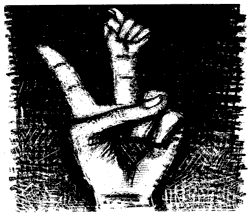 Wth leaders like Amik Serchan and Narayan Man Bijukkche driving the political centre, the contours of what could be decisive change are becoming distinct. For the first time since the Silguri conclave between the Maoists and other communists two years ago, the fringe left has gained a new respectability in the national discourse. During separate conferences steered by Serchan and Bijukkche, the two big parties appeared closer to a common platform on putting the constitution back on track.
Wth leaders like Amik Serchan and Narayan Man Bijukkche driving the political centre, the contours of what could be decisive change are becoming distinct. For the first time since the Silguri conclave between the Maoists and other communists two years ago, the fringe left has gained a new respectability in the national discourse. During separate conferences steered by Serchan and Bijukkche, the two big parties appeared closer to a common platform on putting the constitution back on track. Armed with a new mandate from the Janakpur party convention, CPN-UML general secretary Madhav Kumar Nepal launched his own initiative to widen the field. A day after meeting Nepali Congress president Girija Prasad Koirala, Nepal held consultations with Rastriya Prajatantra Party and Nepali Congress (Democratic) leaders the patriarch has been shunning. That helped Sher Bahadur Deuba mark his official rehabilitation in the hallowed mainstream by bringing together all the parties in the House of Representatives he dissolved, except the Koirala Kangresis. This churning process might seem unchaste to many, but it's part of democratic progress. Professional leaders carry sharper bestial instincts than the pack of political animals that follow them.
The shifting sands of the centre show the resiliency of the core. Politicians tend to treat friends as if they might become enemies because they know it's easier to forgive a foe. Raised on Churchillian faith in the fallibility of democracy, our mainstream leaders know that success is the ability to go from one failure to another with no loss of enthusiasm. They shouldn't be distracted by Baburam Bhattarai's challenge to choose a place between the old and new powers. They're already on firm ground in the middle and should stay there. Rest assured, Nepalis won't let them fade away. (Remember how, during the final Panchayat decade, the district administration allowed parties to organise blood-donation and afford station campaigns as long as their banned status was visible on
the banners.)
The people are furious with the two big parties because they feel betrayed. Shailaja Acharya believes the people are angriest with the Nepali Congress because they had the greatest expectations from them. This probably has more to do with the fact that Kangresis brought democracy twice and blew it both times. People asked to come out and elect their representatives in three-year cycles deserve compassion. In the absence of patient listeners, freedom of expression can turn against its guardians. The parties should spend their time in the wilderness trying to woo the people. That would help us better understand how criticism comes easier than craftsmanship.
Consider some of the bright spots in the post-4 October activities of mainstream parties. Koirala has shown how compromises made to gain and retain power do not corrode a leader's commitment to his core convictions. Nepal, for his part, has come out firmly behind a constitution he helped draft and his party offered critical support to. Pashupati Sumsher JB Rana is evidently torn between the past and posterity. Isn't it remarkable that there are people in the RPP who can even think about preserving the gains of the people's movement?
Kangresis and comrades are still hesitant about the road to take and have an explanation. They can't build an inclusive democracy without repairing the foundation built 12 years ago. (Remember, their key word is preservation.) Koirala and Nepal seem to have no objection to either the reinstatement of the House of Representatives or the creation of an all-party government in keeping with the spirit of Article 128 of the constitution. Although the Maoists have overtaken events, that's still progress. The two big parties seem to have realised that trying to turn a multiparty system into a two-way spoils system can only radicalise the rest.
Not all can abandon the parliamentary process and resort to physical violence to get back into the mainstream. Most leaders who never get elected nurse grievances that go on to fuel the kind of rancour we've been hearing from our more boisterous cabinet members. Most of the parties registered with the Election Commission might have just wanted phone connections and other perks. The listing breeds narcissism with potentially virulent nuisance value. As a gesture of good will, adjectives implying that the six (or four, depending on the meeting organiser) major parties represent the entire political fraternity should be avoided, at least as long as the lower house stands dissolved.
Nepalis know they will always need parties to represent different interests in society and adjust conflicting claims. Who is going to reduce complex problems of public policy to simple slogans for voters? Those who consider their ballots too sacred to squander on the current crop of leaders can't fail to recognise the educational value of political bickering. Even the fiercest critic enjoys targets who can take a liberal dose of censure with tolerance.


